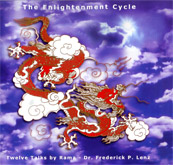
The Enlightenment Cycle
Miracles
Miracles. I like miracles. They inspire me. Miracles cause you to believe, have faith in the unseen, to look further into things, deeper into things. I like miracles. Miracles are the fun of enlightenment.
When a teacher does a miracle - an enlightened teacher - and everyone sees it, they're astonished. Suddenly they have faith in what the teacher has to say about self-discovery and spirituality and enlightenment.
If you see a martial arts teacher dressed in their outfit, in their gi wearing their black belt - it's impressive, maybe. But if you watch them break a brick or several cement blocks with their hands and kick boards and things, it's very impressive. If you're looking for a martial arts teacher, you'll take them seriously because that's not an easy thing to do. Now, breaking bricks and boards is not necessarily the purpose of martial arts and it doesn't necessarily have a lot to do with fighting. But it makes a point, both in training in martial arts and, of course, for the student. The student sees the teacher do this and says, ''Wow, this is incredible! This is a powerful person! This is a unique person who can do this!"
So miracles have a purpose. Miracles help people believe in enlightenment. Enlightenment is something that in the beginning, and even sometimes in the intermediate phases of self-discovery, you're not aware of. You don't see it. It's not something that you're very conscious of. Enlightenment, initially, appears to be subtle - it's just out of the field of your vision. If you're meditating, if you're practicing every day, you don't necessarily see the changes that are taking place in your life because you're so close to them. You don't remember how limited your awareness field was six months ago or a year ago, let alone yesterday, before this morning's meditation. The real miracle, obviously, is the transformation of consciousness from limitation and pain to enlightenment and ecstasy.
But in order to get to an appreciation, a belief, in order to inspire practice, teachers sometimes do miracles - or sometimes they just enjoy doing them. A miracle, a siddha power, is part and parcel of infinity. I suppose you can use them to be egotistical and show off, but somebody enlightened wouldn't do that. They just have fun with it. It's an innocent play. An enlightened person lacks self-consciousness in the sense that there's no ego valuation for what they do. They just do things because it's fun, because it's beautiful or because that's how life flows through them.
So, it's inspiring when you see a miracle. Miracles cause you to believe. When the teacher does a miracle then you say, "Well, if they can do that, they must be unusually powerful, and there might be something to what they are saying about all this self-discovery and meditation stuff. It might be worth practicing."
Some people don't need miracles. They just believe. Or their life is painful, and they just want a change, and they are willing to try something - to try meditation, to try introspection - after trying many other things. Some people are just drawn without a particular reason. Maybe it's just past lives. And that inspires them - their karma compels them to follow the path to enlightenment. But, for many people, miracles are important. They're an important part of self-discovery, and some enlightened teachers do miracles to inspire people. Others do them simply because it's part of their job.
Now, I should point out that from the enlightened teacher's point of view, there aren't really any miracles other than the miracle of life itself. The use of the powers, of the siddha powers, is actually a very scientific application of occult energy through the occult body to do something specific.

